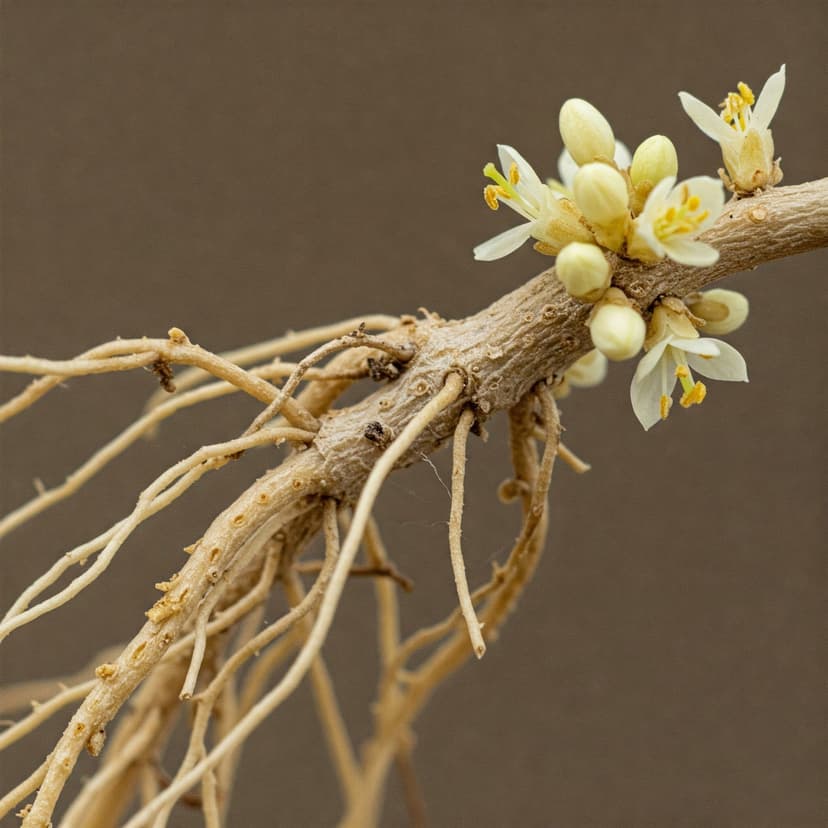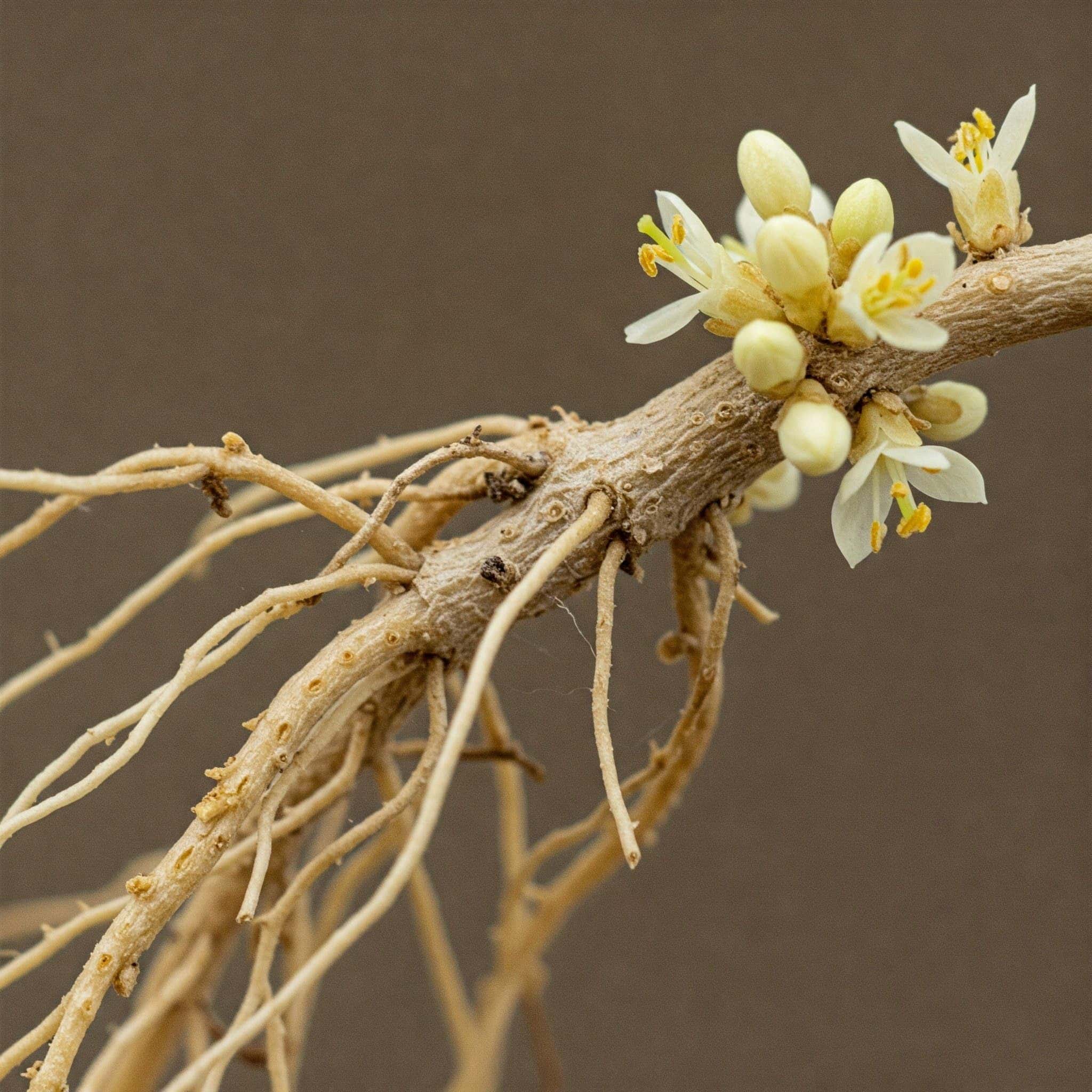


Common Name
Shatavari,
Indian Asparagus,
Shatawar,
Shatamull,
Wild Asparagus
Family
Asparagaceae
Parts Used
Roots (primarily), sometimes leaves
Native To
Native to India and the Himalayan region; also found in parts of Southeast Asia and Africa, thriving in tropical and subtropical climates.
Historical and Traditional Uses:
Ayurveda Revered as a “Rasayana” (rejuvenating tonic), particularly for women’s health, addressing fertility, lactation, and hormonal balance. Traditional Indian Medicine Used for digestive issues, promoting vitality, and as a cooling and soothing agent. Other Traditional Systems Recommended as an adaptogen to enhance resilience to physical and emotional stress.
Chemical Composition:
- Saponins: Shatavarin I-IV (key bioactive compounds)
- Flavonoids: Quercetin, rutin
- Alkaloids: Asparagine
- Steroidal Glycosides: Racemosides A-F
- Other: Mucilage, oligosaccharides, and essential fatty acids
Pharmacological Properties:
- Adaptogenic: Enhances resilience to stress.
- Hormonal Modulation: Balances reproductive hormones, particularly in women.
- Immunomodulatory: Boosts immune function by stimulating macrophage activity.
- Anti-inflammatory: Reduces markers of inflammation.
- Antioxidant: Protects cells from oxidative damage.
- Galactagogue: Enhances breast milk production in lactating women.
Evidence-Based Uses and Benefits:
1. Women’s Health:
- Fertility: Improves ovarian function and supports conception.
- Menopause: Alleviates symptoms like hot flashes, mood swings, and vaginal dryness.
- Lactation: Proven galactagogue effect increases breast milk production.
- Key Study: Sharma et al., 2018 demonstrated Shatavari’s efficacy in hormonal balance (DOI: 10.1016/j.jep.2018.06.019).
2. Digestive Health:
- Effect: Soothes gastric ulcers and reduces acid secretion.
- Study Reference: Bhatnagar et al., 2005 observed protective effects against gastric ulcers.
3. Immune System Support:
- Effect: Boosts macrophage activity and cytokine production.
- Clinical Insight: Confirmed in preclinical studies on immunomodulatory effects.
4. Anti-inflammatory and Antioxidant Benefits:
- Effect: Reduces systemic inflammation and oxidative stress.
Counter-Indications:
- Estrogen-sensitive conditions (e.g., breast or uterine cancer) due to mild phytoestrogenic effects.
- Severe kidney or liver conditions (consult a healthcare provider).
- Allergy to plants in the Asparagaceae family.
Side Effects:
- Mild gastrointestinal discomfort (bloating or diarrhea) in some individuals.
- Rare cases of allergic reactions, such as skin rash or itching.
Drug Interactions:
- Hormonal Therapies: May enhance or interfere with hormone replacement therapy or contraceptives.
- Immunosuppressants: May reduce efficacy of drugs like cyclosporine.
- Anticoagulants: May alter blood-thinning effects when combined with herbs like turmeric.
Research and White Papers with Links:
1. Hormonal Modulation: https://pmc.ncbi.nlm.nih.gov/articles/PMC11079574/
2. Digestive Health: (https://pubmed.ncbi.nlm.nih.gov/16185185/)).
3. Stress Management:
4. Anti-inflammatory Effects: (https://pubmed.ncbi.nlm.nih.gov/25612138/)).
5. Effect of Asparagus racemosus (shatavari) on gastric emptying time in normal healthy volunteers: (http://www.ncbi.nlm.nih.gov/pubmed/2097375)
6. Gestation and lactation: (http://www.himalayahealthcare.com/pdf_files/diabecon001.pdf)
7. Clinical trial for evaluation of galactagogue activity of Asparagus racemosus Willd:(http://www.ncbi.nlm.nih.gov/pmc/articles/PMC3869575/)
8. Anticancer activity from the roots of Asparagus racemosus:(http://www.ncbi.nlm.nih.gov/pubmed/23248403)
Conclusion:
Shatavari (Asparagus racemosus) is a cornerstone herb in Ayurvedic medicine, revered for its adaptogenic, galactagogue, and immunomodulatory properties. Its benefits for women’s reproductive health, digestive health, and stress management are well-supported by traditional use and modern research. However, caution is advised in hormone-sensitive conditions or when combined with specific medications. Shatavari remains a versatile and essential herb in integrative and traditional medicine, particularly for enhancing vitality and hormonal balance.



